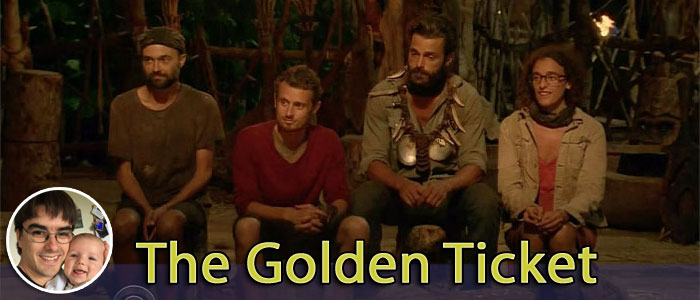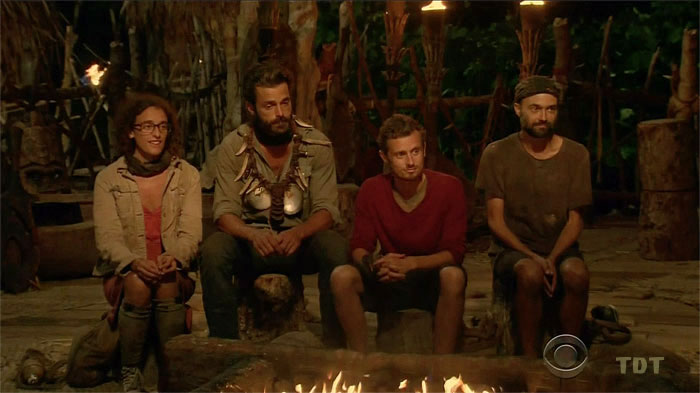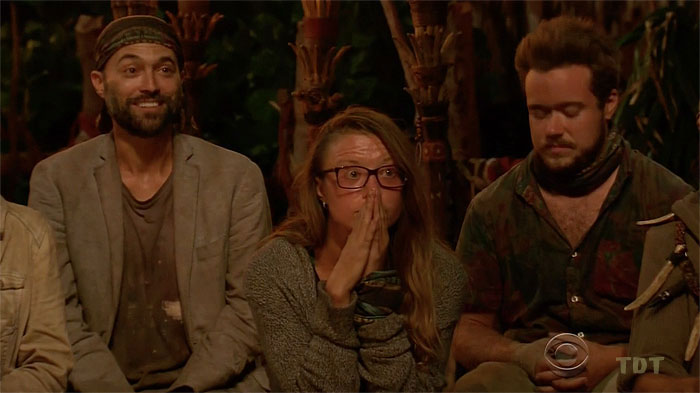

Hi everyone. My name is Ben Martell, and welcome to my new blog, The Golden Ticket, with which I will analyse Survivor each week in a way that I hope makes you think, comment, laugh (with me or at me, your choice), or at least perhaps read some of the bits I write. At least one or two of you.
So, lets see what’s on the ticket for this week:
- A little about me
- What’s this column all about?
- The state of the game
- A secret formula
- A plea
A little about me (and in praise of TDT)
 By day, I’m a 30-something year old public commercial lawyer from New Zealand. The profession probably colours some of my thinking about the show, with the most obvious way being my perspective that lawyers just aren’t cut out to win this show (but I have one exception to this rule, which is the delusion that I could break the mould, if only I was American and the show could cast me).
By day, I’m a 30-something year old public commercial lawyer from New Zealand. The profession probably colours some of my thinking about the show, with the most obvious way being my perspective that lawyers just aren’t cut out to win this show (but I have one exception to this rule, which is the delusion that I could break the mould, if only I was American and the show could cast me).
By night, I sit down and watch TV shows with my wife, and have a 3-month old boy whose first TV viewing experience was Survivor. I made him watch. But he loves watching it... all the pretty colours in those challenges... I’ve got him hooked already.
I’ve watched and loved Survivor since the start, and at this point I know just what I love about the show. Some of my favourites won’t be your favourites (Cook Islands will always be top tier for me, and Yul remains my favourite winner). Some of the seasons you probably like I won’t be as high on (don’t expect me to rave about Micronesia, a season I felt was ravaged by injury, poor casting and an unfortunately timed final 2 twist). I hope that, in agreeing or disagreeing with my thoughts this season, we find plenty to talk about!
I inhale Survivor talk, and so both before and during the season there are many people I have to read and listen to. Josh Wigler, Gordon Holmes, everyone in the RHAP team, Dalton Ross... I try to keep up with these every week if possible, and so you’ll probably see cross-pollination as I grapple with whether I agree or disagree with the prevailing wisdom about each episode.
But, for as long as I can remember, my first stop has been True Dork Times. I started coming here because Jeff was good at compiling spoilers and their sources in earlier days, when my self-control was low (and when Jeff compiled spoilers in his Survivometer – go look some of the old ones up if you weren’t around, because they are a genuine relic of the online Survivor community of the time). I stayed to read Jeff’s words, and then Andy Baker’s words, and this became the site that made me think, comment and laugh. And for that I’ve been thankful for a long time. And so it’s a genuine honour for me to be asked by Jeff to write for all of you and be a part of what True Dork Times has to offer.
What’s this column all about? (and will I actually stick to that concept...)

At the moment my concept for this blog is pretty simple – each week, I lay out a ticket of what I’m going to talk about, and then I talk about it! If there’s a new advantage, I’ll talk about that. A big move happens? I’m going to be debating its merits. The ticket will largely be dictated by what happens on the show. If it’s making me think about what decisions people should be making, then that’s what I want to write about! If it’s an uneventful week on the show, I’ll probably have less to say. However, there are a few consistent aspects you can expect from this column.
Each week, I intend to break down each player remaining in the game and how they are playing from three specific angles – their strategic game, their social game, and their timing. While strategic and social games speak for themselves, I see ‘timing’ as a separate and distinct consideration. Why? Because the exact same strategic or social move, made at a completely different time, can make a dramatic difference to a person’s game. Do something too early, and you will be seen as a threat and voted out before you can control the game. Do something too late, and you will be seen as someone who wasn’t playing the game when it mattered. I want to be able to discuss the merits of the move, and the merits of the when of that move, separately.
An example from last season – Ken’s move to vote out David at final 4 was a good strategic move. He could not have won if he did not vote out David. It didn’t burn too much social capital, as David did not appear to harbour ill-will and would probably have understood why Ken did it (if Ken had a chance of winning, I imagine we would have had an exchange somewhat like that of Earl and Yau Man in Fiji). However, waiting until the final 4 to vote out David, and to even publicly discuss voting out David, meant that it appeared to the jury that Ken must have been convinced to do it by another player. His choice of timing meant that making the correct strategic decision had no actual impact. It’s this kind of situation – the right decisions, made at the wrong times – that I want to be able to explore.
I also want to look past the show that we see on screen and speculate a bit on what is really going on under the surface. Survivor often gives little context for the choices of people who aren’t great TV or simply aren’t particularly essential to the way that the season ends up playing out. This can lead to people being overrated or underrated because we can judge only on the simple narrative provided to us at face value. I intend to assume that every player is making the moves that they believe they need to make to win (especially in an all star season like Game Changers), and so through a mix of hard evidence and complete imagination I will do my best to discern why each player is doing what they’re doing, and then judge those decisions.
Another thing I hope to bring you each column is a little extract from my mother, who is the closest thing I have found to someone who has the exact opposite opinion about literally everything in Survivor to what you would normally see online. She has watched Survivor with me from the start, and I thought it might be interesting to get her take. Here is a teaser for things to come...
"Ben: “Tony is coming back for season 34”
Mum: “I don’t remember Tony”"
This should be fun!
The state of the game (after season 33, and after season 32)

Survivor is a game that is constantly changing and evolving. A good move ten years ago may not be a good move today. It’s also a game that is played within the context of the other people you go out there with. A good move last season might not be a good move this season. Because of this, it’s very difficult to know exactly what a ‘good move’ will be until you start to see the season unfold. Despite this, I’m going to attempt to tell you what ‘good Survivor play’ looks like at this point in Survivor history.
After Millennials vs Gen X
We are now in what I think of as the ‘post-TEOS’ era of Survivor. For those who don’t know, TEOS is The Evolution of Strategy, an audiobook in which Rob Cesternino and Josh Wigler discussed every season and every episode of Survivor, talking through the moves that people made and evaluating whether or not they were good or bad moves. At this point, many Survivor fans have listened to TEOS and it appears to me that this has created a certain level of consensus within the fan community about what ‘good’ moves and ‘bad’ moves look like within the game.
There is no doubt that TEOS affected the game in season 33, at least. Zeke has spoken about how he bonded with David over the fact that they had both listened to TEOS and other Survivor media, but it also lead to both of them understanding each other a little too well – they knew they had a shared understanding of what a good move and what a bad move was, and what the optimal timing for a good move was. One of the key rules coming out of TEOS was ‘make your move when there are odd numbers’ – 9 and 7 being the most effective times to make big moves. There are many key reasons for this, but here’s one good one... you’ll avoid a rock draw.
Zeke and David each understood that the other was probably going to come after them at that optimal moment – the final 9. So, each of them decided to try and get the drop on the other and get the other booted at the final 10, even though they both understood that making a move at even numbers was suboptimal. As a result, they got the rock draw and put even bigger targets on both of their backs than what was already there.
This is the “Prisoner’s Dilemma” of Survivor – if you know your opponent will play optimally, then your suboptimal play might give you the advantage of surprise and help you win the game. But if both players try and get the same advantage by making the suboptimal move, it can blow back on both of them.
Millennials vs Gen X was fascinating for the amount of suboptimal play it had from very smart fans of the game. Many people saw this as poor play from people who couldn’t put their game knowledge into practice. I saw it differently. I saw a group of people who understood that once everyone knows exactly what ‘optimal’ is, it is no longer optimal at all. Survivor appears to be entering an era of metagaming, where players shy away from making the ‘best’ move on the table because it is too predictable and too easily countered.
So what does this mean for how someone should play?
The final three of Adam, Hannah and Ken was, to me, one of the most interesting final threes we’ve had in a while from a purely historical perspective.
Around season 11, I think it’s quite possible that Ken wins – he played a relatively clean game that didn’t upset many people, made the one key strategic move he needed to make just before the end, won several immunities, had good uses for the money, used an advantage well, and voted every person on the jury out except Jessica... that’s about everything that mattered back then. What he didn’t do was spend 39 days strategising with every castaway out there, but you weren’t expected to plot with your enemies back then.
Around season 22, I think it’s quite possible that Hannah wins. The era of a Ken-type win is over, and we are in a phase where genuine loyalty is important and making moves that don’t work is looked upon as a failure. Adam whiffed with his idols, damaged his game with the Taylor situation, and got caught with his hand in the figurative mason jar by telling an enemy about his advantage without telling his allies. Adam likely faces a jury that is angry at him and considers his play to be poor, whereas Hannah can genuinely claim to have controlled the end game as she chose who was voted out at each point. That might have been enough for Hannah at that point.
But in season 33, Adam is a 10-0-0 winner, despite all his apparent mistakes. Why? I believe one key reason is because the jury saw Adam’s play as making the optimal moves for him. They understood that in reaching out to Taylor (and Jay, and later Bret), Adam was simply trying to create bonds that he could use where necessary. They understood that using his idol on Hannah at final 9 protected his side from an unpredictable Will, whose vote Adam couldn’t rely on. And they agreed with Adam when he wanted to take out David sooner, and considered his desire to do it as a strong positive for his play, but his failure to succeed at final 5 to be a case of others playing poorly rather than Adam playing poorly.
This suggests that the paradigm of what makes a good Survivor winner is shifting. No longer do you necessarily have to show you’ve controlled the game, or that you’ve made successful moves that have gotten you to where you are. Instead, it may be enough to convince the jury that your moves were objectively the optimal moves for you to make, even if they didn’t work out.
In fact, given that making optimal moves successfully puts a big target on your back, making optimal moves unsuccessfully may now be the best way to win the game.

After Kaoh Rong
But this cast didn’t see season 33, so this state of Survivor won’t kick in until season 35, right?
Well, maybe. I doubt that many of the people on the cast (other than Zeke) have listened through TEOS, for example. And the cast has quite a few people in it that seem unlikely to see the game in quite the same way as the cast of Millennials vs Gen X did.
But, it’s still full of savvy strategists who had seen all the same seasons that the cast of season 33 had. Aside from Zeke, players like Tony, Sandra, Cirie, Andrea, Aubry and Malcolm already know a bit about playing optimally. How similarly this season’s jury plays to last season will depend on how much the jury values the social game and loyalties as opposed to playing optimally.
There is an aspect to winners that I think was clear in Cambodia and Kaoh Rong and continued with Adam in Millennials vs Gen X, and this may be the most important thing for contestants on Game Changers to understand and replicate, and that is that you need to share the game that you are playing with the other players out there while the game is going on. While blindsides are a necessary ingredient of beating people on the game, openness is quickly becoming a necessary ingredient of winning, and finding a balance between the two is important.
In Cambodia, Tasha appeared on screen to play a decent game (although not better than Jeremy). She controlled the situation at Angkor tribe well to work her way out of the minority. She touched base with her allies on a daily basis. But she got no respect for any of these things because she was not talking to them about making key moves, and so the things she did well could not be respected and she was seen as passive. In Tasha’s case, this was probably a fair assessment.
In Kaoh Rong, we saw Aubry lose the game because ‘she got weaker’ while Michele ‘got stronger’. Some of the jury members who did not vote for Aubry at the time have subsequently said that they did not see how well she was controlling the game during the game. Julia and Jason, in particular, have said that Aubry did not talk to them about strategy at all after the merge. In Aubry’s case, the assessment of her game was off base.
In Millennials vs Gen X, we saw Hannah pleading her case as to why her moves were better decisions than Adam’s moves – and she had a point. Adam was trying to get David out at final 7, which could have left him exposed to a Jay/Bret/Sunday/Ken alliance at final 6 (especially if Jay won immunity). The problem was that, during the game, Hannah was being noncommittal about her strategic decisions and, even worse, it appeared to Bret and Sunday that she agreed with their assertion that taking out David would be the optimal move for her. Instead, Hannah needed to be telling them in clear terms why taking David out would not be a good move for her.
Jeremy, Michele and Adam had something in common – in every case, their game was essentially out in the open for every member of the jury to judge. When it came to final tribal council and they argued their case, the jury heard things they already knew. When others argued their case, the jury heard fresh news, and they weren’t inclined to believe things that they didn’t see with their own eyes.
A secret formula (for winning the game)
Having said all that – here is my secret formula for winning survivor in the current metagame:
- Figure out who the biggest perceived target is in the game (or, if you are good at influencing, decide who the biggest threat is and make everyone else perceive it that way);
- Tell everyone, especially those who are not in your alliance, that you are trying to remove that target;
- Actually try to remove that target (or at least do things that make it look like you are trying); and
- Fail until the last possible moment.
There you have it. Now someone go get cast on season 35, do this, and tell me how it works!
A plea (because I’m not beneath grovelling)
So that’s me in a nutshell. A very large nutshell. I write a lot of words. I hope that you’ve enjoyed them.
I’ll be back with a cast assessment, and other pre-season thoughts on Game Changers, at some point soon. But until the next Golden Ticket - please comment and engage with me!!! I am writing this partly because it’s fun, but in large part because I want to engage with the lot of you. Feel free to say I’m wrong! Feel even more free to say that I am truly the wisest blogger you have ever met. All opinions are valid here, and I will engage with you back! Feel free to call me Ben or Golden (my internet handle in all places). I’ll answer to either.
 By day, Ben Martell is a public commercial lawyer from New Zealand. By night, he moonlights as a self-described Survivor 'expert'. By day or night, find him on Bluesky.
By day, Ben Martell is a public commercial lawyer from New Zealand. By night, he moonlights as a self-described Survivor 'expert'. By day or night, find him on Bluesky.
- Recaps index
- Pre-S34: The secret formula
- Cast: Baseless speculation
- Eps.1-2: Survivor Game No-Changers
- Ep.3: Goat hunting
- Ep.4: Firing blanks
- Ep.5: Famous firsts
- Ep.6: Effective grooming
- Ep.7: Putting compassion first
- Eps.8-10: A question of timing
- Ep.11: A strategic caterpillar
- Ep.12: Three stories
- Ep.13: Three stories broken